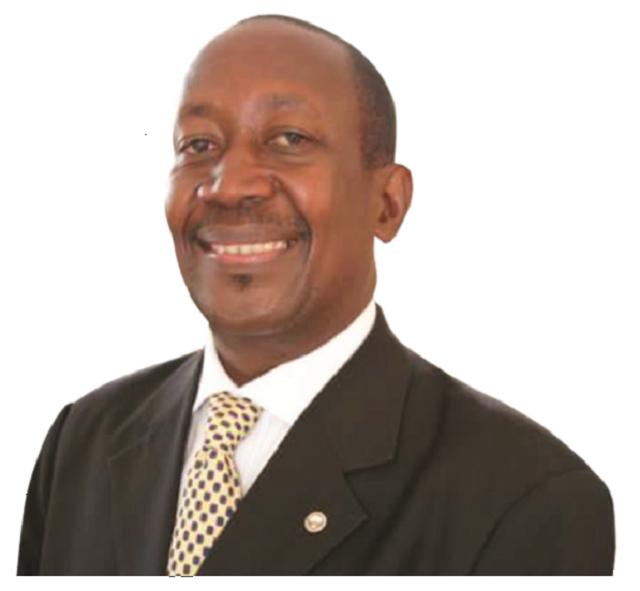
Tribute: Andrew Patrick Luwandagga
When Uganda’s national football team, the Cranes, lined up against the Congo Republic’s Red Devils on Saturday, Nov. 12, in a World Cup Group E second round fixture at Mandela National Stadium, a well-known voice Ugandan football fans had grown accustomed to for decades, was conspicuously absent.
Veteran Sports commentator Andrew Patrick Luwandagga had died almost a month earlier, on Oct.22. He was 61 years old.
For over 40 years, Luwandagga has been a fixture in the living rooms of millions of Ugandans every Tuesday and Friday when he presented programmes like `Sports Desk’ and `Sports Diary’, sometimes alone but also with colleagues like the late James Opoka and Eddie Kakinda, and later with Jane Kasumba and a trove of youngsters, when the old-guard passed on earlier.
On match day, when the Cranes were in action, Luwandagga would either be in the commentator’s box at Nakivubo Stadium or increasingly at Mandela National Stadium, or in the studios of Uganda’s only national broadcaster, UBC in Kampala.
During commentary, Luwandagga usually did the colour; analyses of players’ moves, the strategy of the coaches, the significance of a game or event, and provided nuggets of history or background. He left the play-by-play to other veterans like Eddie Kakinda and Mike Arerenge. Although his tongue was swift and could reel off words faster than a machine gun fires bullets, Luwandagga’s commentary was often unhurried. Contrasted with the tension on the pitch, it was calming. His voice was soft but commanding and authoritative. It also matched his deep knowledge. This was felt most when he exhorted fans in the stadium to rev up their support for the national team, the Cranes, with commands like “tuluuumbe!” Or “Let’s attack.” The crowd would immediately become energized and roar back. Most times he simply roared “Uganda Oyee” and the crowd draped mostly in black, yellow and red, Uganda’s national colours, bellowed back.
Luwandagga was born to love football. By the early 1970s, as a teen, he was already a committed fan of Uganda’s top club; Express Football Club aka the Red Devils. These were the dark days of then-President, Gen. Idi Amin Dada and before long Luwandagga’s club upset one of the big-men then; Gen. Abdullah Nasur who was a no-nonsense governor of Kampala. Abdullah promptly banned Express FC. But the ban left a vacuum as the other top club, KCC FC, now did not have any competition and diehard Express FC fans like Luwandagga could only support KCC FC over their dead body.
Moses Matovu, his half-brother recalls that like other Express FC fans, Luwandagga was frustrated, and when a new team called Nakivubo Boys emerged, they threw their frenzied support behind it.
People close to him say, as early as 1970, when he was just 15-years old in primary school, Luwandagga already told them he knew what he wanted to be – a radio presenter. Like many of the people he would eventually work with, Luwandagga picked interest in radio presenting from listening to the BBC radio.
He had jumped at the chance when the only radio in the country, Radio Uganda, in 1974 announced it was hiring. He had just cleared his Senior Four national examinations at Old Kampala Secondary School. But these were the tough days when most professionals, especially journalists had fled the murderous regime of Idi Amin. He met Fred Sekitto, a veteran presenter, who took him under his tutelage and proved to be a lifelong mentor. “I don’t regret having brought him in USPA [Uganda Sports Press Association] as many of us can see his fruits,” said Sekitto at Luwandagga’s requiem mass. He said he was impressed by the rookie reporter’s willingness to learn.
Luwandagga started on the announcement desk in 1975, where he presented sports and music. Meanwhile, his Nakivubo Boys team later metamorphosed into SC Villa of which he was a lifetime member.
In 1980, when he was appointed Villa publicity secretary, he raised the club profile using the media to drum up the club from the shadow of giants KCC. Soon Luwandagga’s communication skills and broad knowledge of sports and news events soon thrust him onto UTV in 1984.
UTV was the only television for decades and for millions of Ugandan viewers, this was the only programme to watch. Luwandagga became a household name for his longevity on screen.
Later, Luwandagga’s administrative qualities that would make him qualified for a number of leadership roles at UBC, at national level, and in sports, soon emerged. Over the years, he got some training with BBC radio and Channel France International.
At the time of his death, he was the head of sports and current affairs at UBC.
Luwandagga was one of the founders of USPA and served as General Secretary from 1988-1990 and then as President from 1991 to 1993. Luwandagga also became the first Vice President of FICTs (Fedération Institutional Cinema Television Sportifs) a member organization of the International Olympic Committee’s Commission for Culture and Olympic Education.
He was also the coordinator of the FICTS festival commission and was jury president of several festivals of the World FICTS challenge all around the world.
There is a generation of Ugandans who say they ended up loving sports because of Luwandagga. Indeed when acting UBC directors asked all those that had gone through his hands at the requiem mass, hundreds stood up to the amazement of many.
Luwandagga was born to Bayiringisa Luwandagga and Christina Solome Nakitto in Kampala on Sept.21 1955 in Kampala. He is survived by his wife, Sarah Luwandagga and five children, two girls and three boys. Wherever Andrew Patrick Luwandagga is, he will be hoping that the Cranes push on for an unlikely berth in Russia for the 2018 World Cup.
****
editor@independent.co.ug
 The Independent Uganda: You get the Truth we Pay the Price
The Independent Uganda: You get the Truth we Pay the Price



